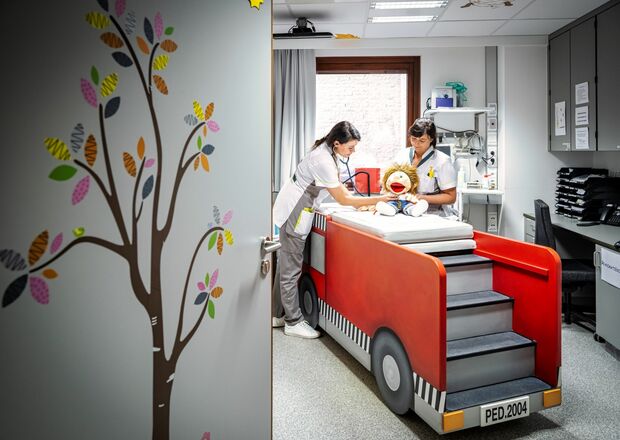Your child is having surgery? What next?
Preoperative questionnaire
Before every surgery, you should fill out a preoperative questionnaire found in mynexuzhealth. This is to clarify your child's general state of health. This is important for the purpose of anaesthesia and monitoring body functions during surgery.
If you wish, you can make an appointment with an anaesthesiologist before the surgery for additional information regarding anaesthesia or sedation.

How do you prepare your child?
- Before surgery, your child should not eat or drink anything for quite some time to avoid nausea during surgery.
- Give your child a bath the night before.
- Don't mislead your child but tell the truth. Not sure what to say? Ask a nurse for help.
- Let your child feel that it is okay to be afraid of the procedure. Don't minimize the fear, but don't overdo it either.
- Babies and toddlers can only make it known through crying that they are anxious. Being patient is important.
- School-aged children are more independent but continue to need their parents' presence.
- Bring a stuffed toy or personal item so your child has a hold on them.
- Your child will be admitted to the pediatric unit. You are always welcome to visit the department beforehand. This way your child will already be familiar with the environment.
Rules at the pediatric ward
The surgery
Your child will be prepared in the doctor's office. The nurse will ask you to undress your child and ask some necessary questions. Then weight, height and body temperature will be measured. Your child will be given a surgical gown to wear. One parent may go along to the operating room. A nurse will pick you up from the waiting room when the surgery is over so that you can support your child as they wake up.
In the operating room
The doctors and nurses wear blue and green suits and have hats on. The anaesthesiologist reassures your child and, if necessary, starts the infusion. This drip will give your child adequate fluids and any medication during surgery.
Usually your child is put to sleep with a mask where they are allowed to blow into a 'balloon'. During the surgery, the anaesthesiologist has constant control over such things as heart rate, breathing, blood pressure, oxygen levels and so on.
The recovery room
After surgery, your child will be taken to the recovery room. This is a separate room near the operating room. Here your child will be observed for a while by the nurses. From then on, you can accompany your child again. There may still be tubing connected to the body temporarily. The anaesthesiologist decides when your child may return to the room and administers medication in case of pain.
Complications
After surgery, nausea and even vomiting may occur. Allergic reactions may also occur since your child will be in contact with all kinds of substances to which they may be allergic without knowing it. If a tube is inserted into the trachea for ventilation, it may cause hoarseness for several days after surgery. Occasionally there are worse effects. This is exceptional and may be due to the anaesthesia, surgery or a pre-existing disease condition.
Practical info
Departments
For more information about admission, please visit the children's department (paediatrics). If you would like more information about anaesthesia or sedation, please make an appointment with one of our anaesthesiologists.